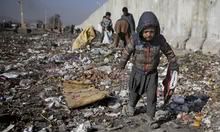

Efforts to eradicate extreme poverty globally are being severely undermined by mounting challenges in fragile and conflict affected situations (FCS), according to a new World Bank report released Friday. The report emphasizes that without urgent international intervention, including debt relief and technical assistance, the world risks backsliding on decades of development gains.
The study is the World Bank’s first comprehensive analysis of FCS economies since the COVID-19 pandemic and paints a sobering picture: over 420 million people living in conflict-affected nations now survive on less than $3 a day. This figure represents more than half of the world’s extremely poor population, even though these countries comprise less than 15% of the global population. By 2030, this number is projected to rise to 435 million or nearly 60% of the world’s extreme poor.
“FCS economies have become the epicenter of global poverty and food insecurity, a situation increasingly shaped by the frequency and intensity of conflict” the report states.
Don’t miss any more news by subscribing to our Telegram channel
And our Facebook page
The consequences of prolonged violence and instability are far reaching. Economic output in these countries is declining, with high-intensity conflicts capable of shrinking per capita GDP by as much as 20% over five years. On average, per capita GDP in FCS economies has contracted by 1.8% annually since 2020, while other developing economies have grown by 2.9% per year.
The report also highlights human development setbacks in conflict-ridden regions. Life expectancy in FCS economies is seven years shorter, and the average education attainment is limited to just six years of schooling. These disparities are compounding vulnerabilities, especially as many of these nations experience rapid population growth and rising unemployment.
Progress in reducing global poverty has stalled since the mid-2010s, according to the World Bank, driven by a combination of intensifying conflict, institutional weakness, and slow economic growth.
To reverse this trend the World Bank urges a

coordinated international response centered on long-term engagement. Key recommendations include:
– Addressing root causes of conflict, including social exclusion and lack of justice
– Investing in education, healthcare, and infrastructure
– Creating economic opportunities, particularly in agriculture and tourism
-Strengthening local institutions and governance capacity
“With sound policies and sustained global engagement, FCS economies can chart a better path toward development” the report concludes.
The World Bank calls on the international community to act swiftly and decisively, noting that stabilizing fragile states is essential not only for alleviating poverty but also for ensuring long-term global peace and security.
Source Reuters
Emebet Asefa Correspondent
Addis Abeba Ethiopia




